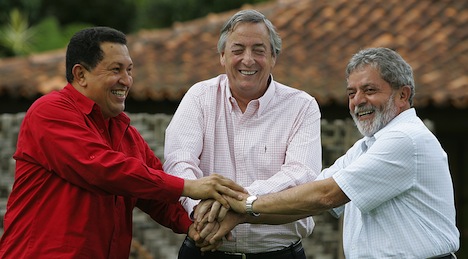In a piece for The National Interest today, I stepped back from the immediate issues surrounding Sunday’s presidential election and the fallout, increasingly tense, with challenger Henrique Capriles canceling a march today against potential fraud in the election and with president-elect Nicolás Maduro very much using the threat of state violence to shut down the opposition’s mobilization for a full recount.![]()
![]()
It’s a piece I’d been hoping to write for some time, and I wish I’d published it sooner, but it’s still relevant given how much the late Hugo Chávez (pictured above in happier times with the late Argentine president Néstor Kirchner and former Brazilian president Luiz Inácio Lula da Silva) looms not only over Venezuela, but over all of Latin America. I’ve written that his radical, anti-American antics have allowed other more moderate leftists in Latin America room to develop a truly progressive, social democratic movement for the first time ever, really. Chávez, at home, transformed Venezuelan politics from a right-left contest to a battle between a more business-friendly, democratic left, as personified by Capriles, and a more socialist, militant leftism, as personified by Maduro.
I argue that Lula da Silva, in particular, has been incredibly canny in triangulating himself between the U.S. center of gravity and chavismo, exquisitely playing one against the other:
But the tidy duality of a moderate lulista left and a radical chavista left obscures the complex, often symbiotic relationship between the two forces. In particular, Lula da Silva was always incredibly cunning in using Chávez as a foil in hemispheric politics. Lula da Silva made three failed presidential bids prior to his election in 2002, fully four years after Chávez took power. By the time Lula da Silva took office, Chávez had arguably done more than anyone else in Latin America to make Lula da Silva seem moderate in contrast.
It’s certain that Lula’s vast social reforms would seem more radical—and may have met more domestic and international disapproval—if not for Chávez’s ad hoc expropriations and anticapitalist fulminations from Caracas. By giving Chávez his full support, he guaranteed especially kind treatment of Brazilian private interests in Venezuela, and his fervent support for Maduro in a taped endorsement earlier this month was provided in no small part to ensure kindness from a Maduro administration. Brazilian officials have already started casting aspersions on the Capriles camp, which has called for a full recount of the vote. But Lula da Silva’s support for Chávez also gently reminded U.S. diplomats that they had an interest in boosting the Brazilian model as a counterweight to the Venezuelan model throughout the region.

One thought on “Chávez’s radical antics provide space for progressive Latin American left”